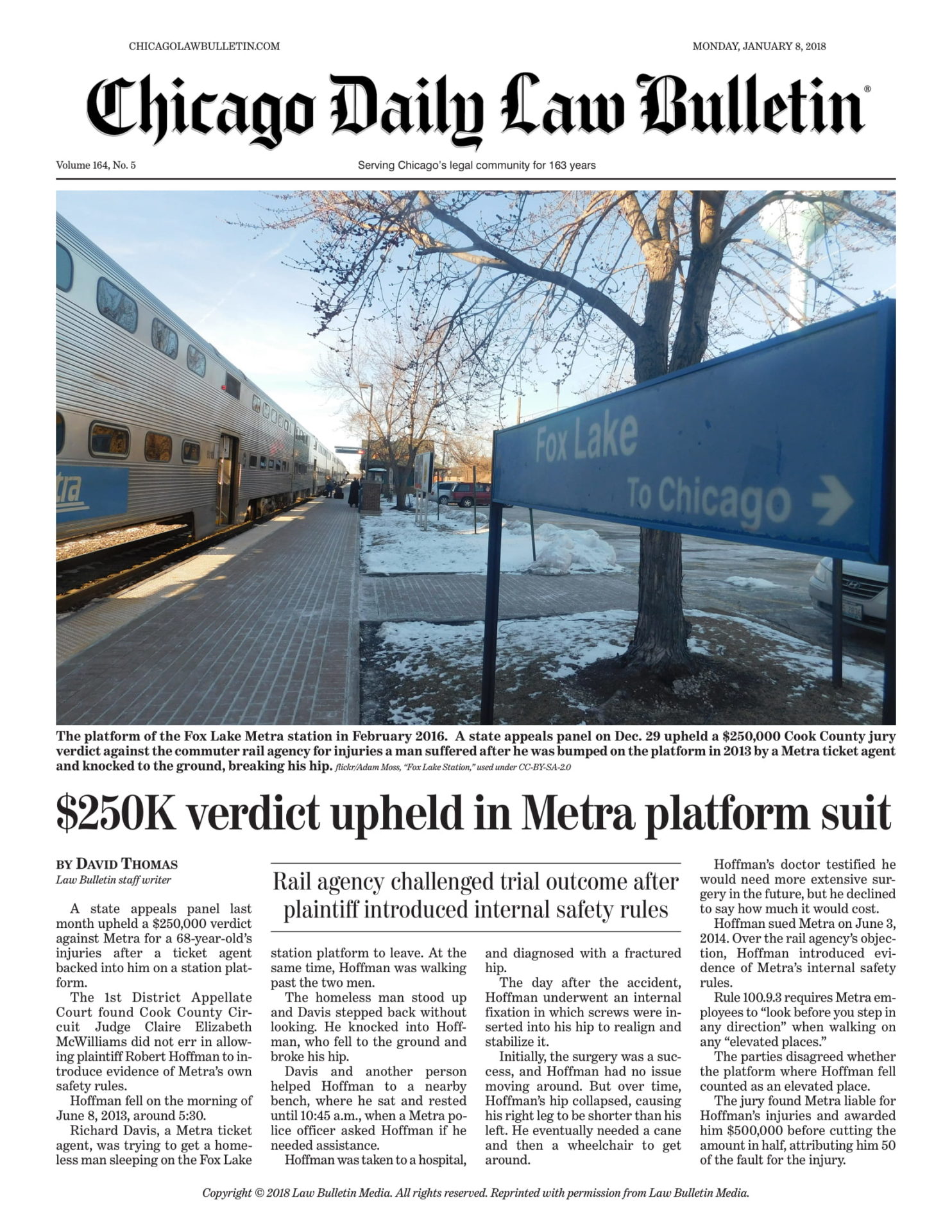
$250K verdict upheld in Metra platform suit
BY DAVID THOMAS
Law Bulletin staff writer
A state appeals panel last month upheld a $250,000 verdict against Metra for a 68-year-old’s injuries after a ticket agent backed into him on a station platform.
The 1st District Appellate Court found Cook County Circuit Judge Claire Elizabeth McWilliams did not err in allowing plaintiff Robert Hoffman to introduce evidence of Metra’s own safety rules.
Hoffman fell on the morning of June 8, 2013, around 5:30.
Richard Davis, a Metra ticket agent, was trying to get a homeless man sleeping on the Fox Lake station platform to leave. At the same time, Hoffman was walking past the two men.
The homeless man stood up and Davis stepped back without looking. He knocked into Hoffman, who fell to the ground and broke his hip.
Davis and another person helped Hoffman to a nearby bench, where he sat and rested until 10:45 a.m., when a Metra police officer asked Hoffman if he needed assistance.
Hoffman was taken to a hospital and diagnosed with a fractured hip.
The day after the accident, Hoffman underwent an internal fixation in which screws were inserted into his hip to realign and stabilize it.
Initially, the surgery was a success, and Hoffman had no issue moving around. But over time, Hoffman’s hip collapsed, causing his right leg to be shorter than his left. He eventually needed a cane and then a wheelchair to get around.
Hoffman’s doctor testified he would need more extensive surgery in the future, but he declined to say how much it would cost.
Hoffman sued Metra on June 3, 2014. Over the rail agency’s objection, Hoffman introduced evidence of Metra’s internal safety rules.
Rule 100.9.3 requires Metra employees to “look before you step in any direction” when walking on any “elevated places.”
The parties disagreed whether the platform where Hoffman fell counted as an elevated place.
The jury found Metra liable for Hoffman’s injuries and awarded him $500,000 before cutting the amount in half, attributing him 50 of the fault for the injury.
“[T]he jury was free to accept Davis’ testimony that the particular rule in question did not apply to him and that he also had ‘a valid reason’ for moving quickly in this particular situation, namely, because a homeless man was suddenly standing up in front of him,” Justice Robert E. Gordon wrote. “By the same token, the jurors were also free to reject it and consider the rule, ‘along with other evidence,’ in reaching their determination that defendant was 50 [percent] responsible for the incident.”
According to Matthew J. Coleman, an associate at the Law Offices of Parente & Norem P.C. and one of Hoffman’s attorneys, the question of the platform’s elevation was not a major factor.
Matthew J. Coleman
“It really didn’t come into play that much. It’s really whether I could confront Rich Davis with the safety rules,” Coleman said. Davis acknowledged the rule’s existence, but argued it didn’t apply to him at the time.
Within the original $500,000 verdict before reduction, the jury awarded $70,000 for future medical expenses. Metra singled out that valuation on appeal.
But the panel rejected Metra’s argument that the $35,000 amount after reduction should be further reduced, finding no abuse of discretion by the trial court.
On appeal, Metra argued McWilliams erred in introducing the railroad’s internal safety rules, requiring a new trial. The rail agency argued the violation of an internal rule does not constitute negligence, although the 1st District panel noted Metra misquoted the decision it cited.
Under Morton v. City of Chicago, 286 Ill. App. 3d 444 (1997), the 1st District panel found that while an internal rule violation does not automatically translate to willful and wanton conduct, a jury can consider it as evidence. That is what the jury did in Hoffman’s case, Gordon wrote.
The panel found that even if McWilliams had erred in introducing the evidence, it would not have affected the jury’s decision.
Metra was represented by Associate General Counsel Kenneth Jones and attorney Jamie Victoria Harrmann.
Metra spokesman Michael Gillis said, “We’ll abide by the appellate decision.”
Hoffman was also represented by Jordan W. LaClair of Parente & Norem.
Justices Margaret Stanton McBride and David W. Ellis concurred with the opinion.
The case is Robert Hoffman v. Northeast Illinois Regional Commuter Railroad Corp., 2017 IL App (1st) 170537.
dthomas@lawbulletinmedia.com
Copyright © 2018 Law Bulletin Media. All rights reserved. Reprinted with permission from Law Bulletin Media.
Latest Posts
P&N BLOG | What Compensation Can You Seek in a Personal Injury Claim?
If you’ve been injured due to someone else’s negligence or wrongful actions, understanding your rights and the compensation available is essential....
P&N BLOG | 8 Common Myths About Personal Injury Law Answered
When you're injured due to someone else’s negligence, navigating the legal process can feel overwhelming. Unfortunately, many people shy away from...
P&N BLOG | The Critical Role of Personal Injury Lawyers
Accidents can occur unexpectedly, leaving victims with physical injuries, emotional distress, and financial burdens. Victims have the right to...
